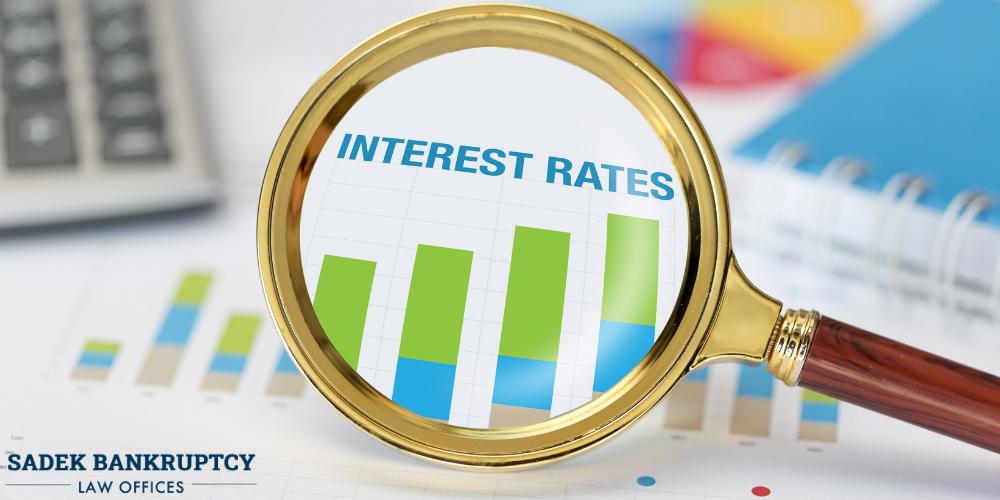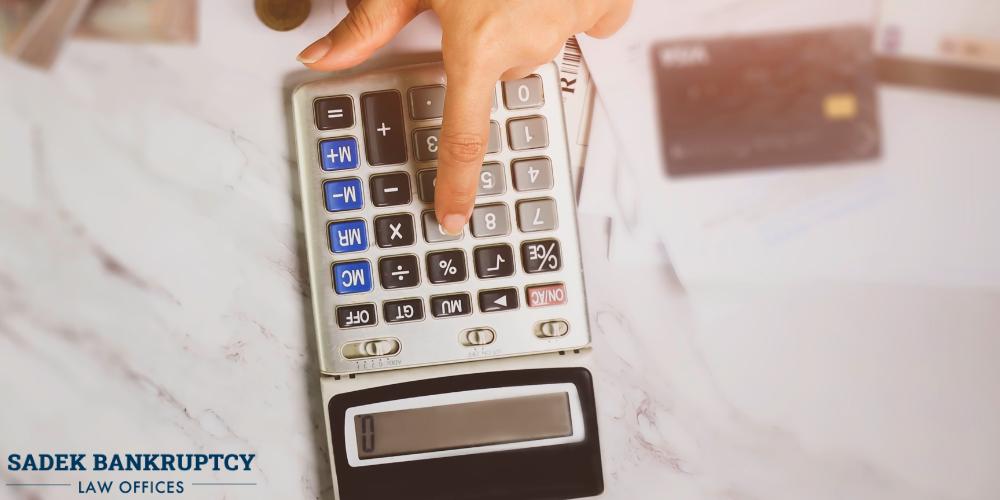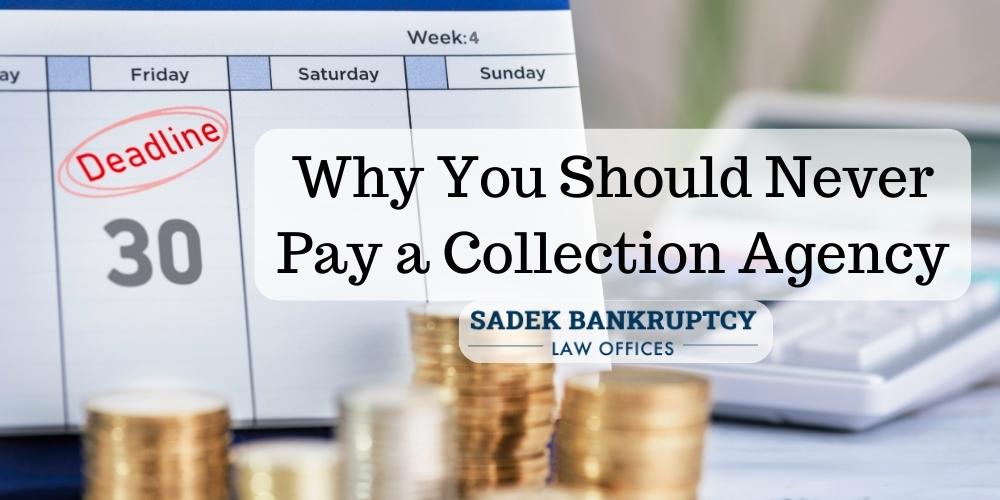Why Should You Never Pay a Debt Collection Agency?
Navigating the murky waters of debt can be daunting, especially when collection agencies knock on your door. At Sadek Law, a leading Philadelphia bankruptcy law firm, we’ve seen firsthand the stress and confusion our clients face when dealing with collection agencies. There are many reasons why you should never pay a collection agency, which we’ll explore in the following sections.
We’ll explain the reasons why settling debts with collection agencies might not be in your best interest. We’ll cover the implications for your financial health, potential legal repercussions, and the alternatives that could better serve your path to financial recovery. Whether you’re drowning in debt or just received your first collection notice, understanding your rights and options is the first step towards reclaiming your financial freedom.
To schedule a free consultation about your case, please call our office at 215-545-0008 today.
Why You Should Never Pay a Charge-Off
A charge-off is a debt that a creditor has given up trying to collect after a significant period of non-payment, such as a credit or bank account. Paying a charge-off might seem like a straightforward way to improve your credit situation. However, there are several reasons why making a payment on a charge-off may not be the best course of action.
For starters, once a debt is charged off and reported to the credit bureaus, the damage to your credit score is already done. Paying the charged-off account won’t remove the charge-off from your credit report, and it typically won’t significantly improve your credit score in the short term.
Each state has a statute of limitations on debt collection, which is the period during which a creditor can legally sue you to collect the debt. Making a payment on a charged-off debt can restart this statute of limitations, giving the creditor or a debt collection agency more time to pursue legal action against you to recover the debt.
If you’re dealing with a charge-off, it’s likely that you’re also facing other financial challenges. Allocating your limited financial resources to pay off a charge-off may not be the best use of your money, especially if you have other debts with more immediate consequences or higher interest rates.
Should I Pay Collections?
Deciding whether to pay a collection account depends on several factors, including the validity of the debt, the statute of limitation on debt in Pennsylvania, the impact on your credit score, and other legal and financial considerations.
First, ensure the debt is valid. You have the right to request a debt validation letter from the collection agency, which provides details about the debt they claim you owe. This is crucial to avoid paying something you don’t legally owe or a debt that has already been paid or settled.
Know the statute of limitations on the debt in your state. This is the period during which a creditor or collector can legally sue you for the debt. Paying or even acknowledging the debt can reset this clock, potentially exposing you to lawsuits for a longer period.
A collection account can significantly damage your credit score, but the impact lessens over time. Paying off a collection might not immediately improve your credit score, but some newer credit scoring models give less weight to paid collections. Regardless, the collection account will remain on your credit report for seven years from the original delinquency date.
Before making a decision, it is highly beneficial to consult with an attorney who is skilled in debt relief. This is especially true if the debt is large or if you’re unsure about the best course of action. A legal professional can offer personalized advice based on your specific situation.
What Happens If You Never Pay Collections?
If you never pay a debt in collections, the immediate consequence is a significant negative impact on your credit score. This derogatory mark can stay on your credit report for seven years, affecting your ability to secure loans, credit cards, and favorable interest rates. Beyond credit issues, collection agencies may intensify their efforts to recover the debt, leading to frequent and stressful communications.
In some cases, the creditor or collection agency might decide to take legal action against you. If the court rules in their favor, you could face wage garnishment, a lien on your assets, or seizure of property, depending on state laws. Furthermore, some financial institutions may require you to settle outstanding collections before approving you for major loans, such as a mortgage, effectively limiting your financial opportunities.
Ignoring a collection account can lead to a cycle of financial strain and limited access to financial tools, making it crucial to address these issues proactively.
Do Collections Go Away?
Yes, collections do go away, at least in terms of their impact on your credit report. According to the Fair Credit Reporting Act (FCRA), most negative information, including accounts that have been sent to collections, must be removed from your credit report after seven years from the date of the first delinquency that led to the collection. This means that after seven years, the unpaid debt will no longer appear on your credit report and will not directly impact your credit scores.
Additionally, Pennsylvania has a statute of limitations on debt of only four years. This means that, after four years since your first missed payment, a collection agency can no longer sue for payment. This does not mean, however, that they cannot seek payment through other means.
Should I Pay a Debt Collector?

Whether you should pay a debt collector depends on various factors. First, verify the legitimacy of the outstanding debt and ensure it belongs to you. If it’s valid and within the statute of limitations, paying can prevent further legal actions and improve your credit score over time.
However, if the debt is nearing the statute of limitations or if you’re facing financial hardship, consider your options. Negotiating a settlement for less than the full amount or arranging a payment plan might be more manageable.
Additionally, prioritize debts based on their impact and urgency. High-interest debts or those affecting essential assets like your home should take precedence. Seeking advice from a financial advisor or a consumer rights attorney can provide insight into your rights and options, helping you make an informed decision aligned with your financial situation and goals.
Do You Have to Pay Debt Collectors?
Yes, if a debt collector has contacted you about a legitimate debt, you are legally obligated to pay it. However, it’s essential first to verify that the debt is yours and the amount is correct. Debt collectors must provide a debt validation letter, and you have the right to dispute inaccuracies.
It’s also crucial to be aware of the statute of limitations on the debt, which varies by state. This statute determines how long a collector has to sue you for the debt. In Pennsylvania, the statute of limitations on debt is four years from the first missed payment.
While paying the debt can prevent legal actions and help your credit score recover over time, if the statute of limitations has expired, they can no longer take legal action to enforce the debt, although they may still attempt to collect. Always consider your financial situation carefully; if you cannot afford to pay the debt, you may be able to negotiate a settlement for less than the full amount owed or seek advice on other options like a payment plan.
Should I Pay the Debt Collector or the Original Creditor?
Whether to pay the debt collector or the original creditor depends on your specific circumstances. If the debt is still with the original creditor and they’re willing to work with you, paying them directly may be simpler.
However, if the debt has been sold to a collection agency, paying the debt collectors might be necessary to resolve the issue. Before making a decision, verify the legitimacy of the debt, negotiate payment terms, and consider any potential legal implications. It’s advisable to communicate directly with both parties to find the most feasible and beneficial solution for your situation.
What Happens If You Don’t Pay a Debt Collector?
If you don’t pay a debt collector, several consequences may occur. Firstly, your credit score will likely be negatively impacted as the debt remains unpaid and continues to be reported to credit bureaus. Persistent attempts to collect the debt may result in increased pressure from the collector, including frequent phone calls, letters, or even legal actions such as lawsuits.
Ignoring these efforts could lead to further financial strain, potential wage garnishment, or the seizure of assets through a court judgment. Additionally, the debt may continue to accrue interest and fees, increasing the total amount owed over time. It’s crucial to address the debt promptly, even if you’re unable to pay it in full, by exploring options such as negotiating a settlement or arranging a payment plan to avoid escalating consequences.
When Do Debt Collectors Give Up?
Debt collectors typically give up their collection efforts when it becomes financially unfeasible or legally prohibited to continue pursuing the debt. This can happen when the statute of limitations for collecting the debt expires, meaning they can no longer sue you for payment.
Additionally, if the debt is small or the cost of pursuing it exceeds the potential return, collectors may cease their efforts. However, it’s essential to note that while collectors may stop actively pursuing the debt, it doesn’t erase your obligation to pay it, and the debt may still appear on your credit report until it reaches the seven-year limit set by the Fair Credit Reporting Act.
Can a Debt Collector Charge Interest?

Yes, a debt collector can charge interest on the outstanding debt, but whether they can legally do so depends on various factors, including the terms of the original contract and state laws. If the original contract allows for interest to accrue on the debt, the collector may continue to apply interest according to those terms.
Additionally, some state laws may regulate the amount of interest that can be charged on a debt. It’s essential to review the terms of the original agreement and familiarize yourself with relevant state regulations to understand your rights and obligations regarding interest charges by debt collectors.
What Happens If a Debt Collector Refuses Payment?
If a debt collector refuses payment, it could be for various reasons. They may believe the debt is not valid, dispute the amount owed, or require documentation before accepting payment. In some cases, they might be prohibited from accepting payments due to legal restrictions or internal policies.
However, if you believe the debt is legitimate and wish to resolve it, you could persist in your efforts to make payment. Document your attempts to pay and seek clarification on why the collector is refusing payment. If necessary, consult with a consumer rights attorney to understand your options and ensure your rights are protected.
Should I Pay a Collection Agency?
It depends. If you can verify the legitimacy of the debt with the collection agency and confirm it is within the statute of limitations, it may be beneficial for you to pay the debt. This can prevent further collection actions and improve your credit score over time.
However, suppose the statute of limitations is near or you’re experiencing financial difficulties. You could negotiate a settlement for less than the full amount or arrange a payment plan. You should also prioritize debts that have high interest rates, or that affect essential assets like your home.
We strongly recommend seeking advice from a Philadelphia bankruptcy lawyer to fully understand your rights and options. Our team can help you make an informed decision aligned with your financial situation and goals.
What Happens If You Don’t Pay a Collection Agency?
If you don’t pay a debt collection company, several consequences may occur. The debt will likely continue to accrue interest and fees, increasing the total amount owed over time. Persistent attempts to collect the debt may result in increased pressure from the collector, including frequent phone calls, letters, or even legal actions such as a debt collection lawsuit.
Ignoring these efforts could lead to further financial strain, potential wage garnishment, or the seizure of assets through a court judgment. Additionally, the debt may remain on your credit report for up to seven years, negatively impacting your credit score and future financial opportunities. It’s crucial to address the debt promptly, even if you’re unable to pay it in full.
Can a Collection Agency Charge Interest?
Yes, a collection agency can charge interest on a missed monthly payment. However, whether this is legal for them to do depends on state laws and the terms of the original contract. If the original contract allows for interest to accrue on the debt, they can charge interest. Thoroughly review the terms of the original agreement and familiarize yourself with all relevant state regulations to understand your rights regarding interest charges.
Should I Pay a Collection Agency or the Original Creditor?
This depends on the specific situation you’re in. If the debt is still with the original creditor, you’re better off paying them. However, if the original creditor has sold the debt to a collection agency, it is likely simpler to pay the collection agency directly. Before deciding whether to pay the debt at all, consult with an experienced bankruptcy attorney about your case. They can help you understand your rights and options, as well as determine the best course of action.
If Debt Is Sold to Another Company, Do I Have to Pay?
If your debt is sold to another debt collection agency, you are still responsible for paying it. The new company that purchased the debt becomes the rightful owner and can pursue collection efforts to recover the amount owed. However, it’s essential to verify the legitimacy of the debt and ensure that the new company has the legal right to collect it.
You have the right to request validation of the debt from the new company and to negotiate payment terms if necessary. Ignoring the debt could result in negative consequences for your credit score and potential legal actions, so it’s advisable to address it promptly.
Is It Illegal for a Collection Agency to Buy Your Debt and Come After You?
No, it is not illegal for a debt collection agency to purchase your debt and pursue collection efforts. When a debt is sold to a collection agency, the agency becomes the new owner of the debt and has the legal right to attempt to collect it. However, collection agencies must adhere to the regulations outlined in the Fair Debt Collection Practices Act (FDCPA), which prohibits abusive, deceptive, or unfair practices in debt collection. This means they must follow certain guidelines when contacting you and attempting to collect the debt.
How Much Do Collection Agencies Pay for Debt?
The amount that debt collection agencies pay for debt varies widely depending on factors such as the type of debt, its age, and its likelihood of collection. On average, collection agencies may purchase debt for as little as a few cents on the dollar, especially for older or less collectible debts.
However, for more recent and higher-quality debts, they might pay a higher percentage of the total amount owed. The actual purchase price is often negotiated between the collection agency and the original creditor, and it’s typically lower than the full amount owed by the debtor.
How to Pay Collections Off

To pay off collections, you can explore various options based on your financial situation. A debt management plan offered by a credit counsellor would consolidate your debts into a single monthly payment with reduced interest rates. You could also opt for a consumer proposal, which allows you to negotiate with creditors to repay a portion of the debt over an extended period. Prioritize affordability and legality when choosing the best option for you, and consult with an attorney for personalized guidance.
Does Paying Off Collections Help Credit Report?
Yes, paying off collections can help improve your credit report, although the impact may vary. While the collection account will still appear on your credit report, it will typically be updated to show that the debt has been paid. This can result in a slightly higher credit score on your credit report sooner, especially with newer credit bureau scoring models that give less weight to paid collections.
However, the collection account will still remain on your credit report for up to seven years from the date of the original delinquency, continuing to affect your credit score during that time. Nevertheless, paying off collections demonstrates responsible financial behavior and may be viewed favorably by potential lenders. Credit bureaus will update your credit report to show which debts you have paid, which may help you in the long run.
Can You Pay Collections With a Credit Card?
In some cases, you may be able to pay collections with a credit card, but it depends on the collection agency’s policies and your credit card issuer’s terms. Some collection agencies accept credit card payments as a form of settlement for the debt.
However, be aware that using a credit card to pay collections may incur additional fees or interest charges. It’s essential to consider the impact on your credit utilization and overall financial health to avoid gaining credit card debt in the process.
Additionally, not all collection agencies or credit card issuers may allow this option, so it’s best to inquire directly with both parties before attempting to use a credit card for payment.
How to Get Out of Collections Without Paying
It is possible to get out of collections without paying, but it depends on various factors. Sometimes, the debt may be invalid or past the statute of limitations, making it unenforceable. You can dispute the debt with the collection agency or credit bureaus to have it removed from your credit report.
Additionally, negotiating a settlement for less than the full amount, such as in debt settlement, or arranging a payment plan, may be options to resolve the debt without paying the full balance upfront. However, getting out of collections without paying typically requires careful navigation of legal and financial considerations
Contact Our Experienced Philadelphia Bankruptcy Attorneys Today
Understanding why you should never pay a collection agency is crucial to navigating the complexities of debt management. At Sadek Law, we firmly believe that blindly paying collection agencies may not always be the most advantageous path toward financial freedom.
By empowering yourself with knowledge, exploring alternatives such as debt negotiation or bankruptcy, and seeking guidance from experienced legal professionals, you can take control of your financial future with confidence. Remember, you have rights, and there are strategic avenues to address your debts while safeguarding your long-term financial well-being.
Let us assist you in navigating through these challenges and finding the best solutions tailored to your unique circumstances. Don’t hesitate to reach out to Sadek Law for skillful guidance and support on your journey to financial recovery.





